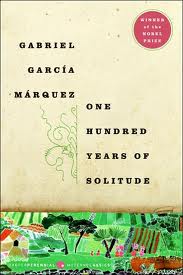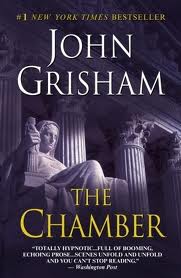 This is considered to be the best book written by the author. He won the Nobel prize for literature in 1982 and I have heard about this book for so long and from so many sources that this was in by `should read‘ list of books for a long time.
This is considered to be the best book written by the author. He won the Nobel prize for literature in 1982 and I have heard about this book for so long and from so many sources that this was in by `should read‘ list of books for a long time.
The story is a generational saga and it would be wise to keep referring back to the family tree given at the beginning of the book often. I said this during the review of A Suitable Boy (reviewed earlier here) but for this book, you need it even more because confusingly almost all of them share two or three names! You have to keep track of the Aurelianos and Arcadios of several generations, especially when they live during the same time frame and interact with each other. The tree comes in handy on these occasiona.
First, let us recap the story a bit. The book opens with the life of Jose Arcadio Buendia, who with this wife Ursula Iguaran founded the village of Macondo, while in fact searching for a way to the sea from his native village in Columbia (presumably, because that is where the author comes from. I do not know if Columbia is explicitly mentioned anywhere in the book). He has enough charisma to carry a large group of people in the search, who then populate the stories in the book.
There is another motive for the move. Since Ursula is a close relative of his, she is afraid that, if they have children, they may be born with a pig’s-tail-like appendage, as happened to a related couple previously and she denies conjugal rights for a while. During that time, taunted by another man, Prudentio Aguilar, who cast aspersions on his virility, he kills him. Tormented by his ghost, the couple is forced to move.
Then follows repeated sagas of visits by a gypsy band to the village where each time they are shown artifacts from the outside world – a magnifying glass, mercury, dentures, ice etc. Each time Jose is absorbed to the exclusion of everything else in the scientific possibilities of the new invention and neglects daily duties to maniacally follow his vision. He strikes a friendship with the chief of the gypsies, Melquiades, that lasts a lifetime.
Melquiades is reported dead but turns up alive much later in the book, simply saying that he came back because he `did not like being dead‘ and lives with the family for a long time before he `really‘ dies. Yes, the stories are quirky in their own way.
The story follows Jose Arcadio Buendia’s life until he goes completely insane and dies.
In the meanwhile, he has a son called Jose Arcadio, who has a son with a semi gypsy called Pilar Ternera, and, confused by this, runs away with the group of vagabond gypsies. He comes back much later in the book to play an important part.
His brother, Aureliano Buendia, later Colonel Aureliano Buendia, goes into politics and leads an armed rebellion on behalf of Liberals against the corrupt, self-seeking Conservative government (Please do not read this as a comment on your favourite country’s politics! ) When the Liberals sell out and join the government, he gets so disillusioned that he spends the rest of his life as a man detached from the world. He, however, finds time to father a child with the (same) Pilar Ternera and 17 other children all named Aureliano (I am not kidding!) with their mothers’ surnames as the last name. Incidentally, all of them are killed in a single confrontation with some enemies of the Colonel when they have grown up, so you as the reader are spared from the problem of how to tell them apart in the story.
He also has a daughter, Amaranta and an adopted daughter, Rebeca, whose rivalry for the same man, Pietro Crespi, poisons their relationship with each other for life. Amaranta incidentally foresees her own death, to the minute it happens. (I told you the story has its quirky bits!)
Jose Arcadio returns to marry Rebeca and Amaranta never marries.
Jose Arcadio’s son with Pilar Ternera, is Arcadio. He spawns a family that includes Remedios the Beauty, who drove men wild and to suicide just by their looking at her once, and simply ascended to heaven body and soul, when her time was up. Her twin brothers include Aureliano Segundo and Jose Arcadio Segundo. Jose Arcadio is as wild as the original Jose Arcadio Buendia, and Aureliano, while equally wild and fond of a bohemian lifestyle, settles down enough to marry Fernanda del Carpio and fathers three children, Meme, Jose Arcadio and Amaranta Ursula. The story ends with the birth of Aureliano, who is the son of Meme, giving birth to his son called – wait for it – Aureliano.
I told you it is confusing!
Now, the above narration is just a skeletal outline of the story that gives nothing away. The uniqueness of the story comes in the telling, in the casual intermixing of the mundane and the fantastic, almost in the style of the movie Pan’s Labyrinth. Supposedly it is the trademark of the author and the book in particular, and that is what made the book famous and memorable. He discusses the fantastic as casually as he discusses the everyday life.
Just to give you a sample. When Colonel Aureliano Buendia shoots himself, his mother opens a vessel she is cooking food in and finds it full of worms. She then `knows’ that something has happened to Aureliano. As said earlier, Amaranta just rises up with the clothes she is folding and disappears into heaven. The blood of Jose Arcadio, when killed, goes all the way turning corners and even skirting around the carpet (so as not to ruin it) to reach the feet of her mother, so that she can follow it to find the fate of her son. An Insomnia Plague strikes the village; it is so contagious that soon the entire village cannot get sleep – but they are not tired as a consequence. So they shrug their shoulders and adjust to the new
reality. Butterflies follow a minor character wherever he goes – not just one or two but a whole swarm of them.
You ask why? Don’t! They just do.
It grated on my nerves a bit. I did not like a far less inconsistency in The Fountainhead (reviewed earlier) and compared to this, that story is a model of propriety. Yet, if you accept the hyperbole, this story does have some charm and takes you to a South American lifestyle in the old times that is interesting.
The style is otherwise fluid and the story is told in a straightforward manner.
I do not think that the book really justifies all the hype surrounding it, and can give it a honest 5/10
— Krishna
 A really cosy, nice, family drama. The story follows the lives of Alice Goodwin and her family, which includes her husband Howard Goodwin and children Emma and little Claire.
A really cosy, nice, family drama. The story follows the lives of Alice Goodwin and her family, which includes her husband Howard Goodwin and children Emma and little Claire.







